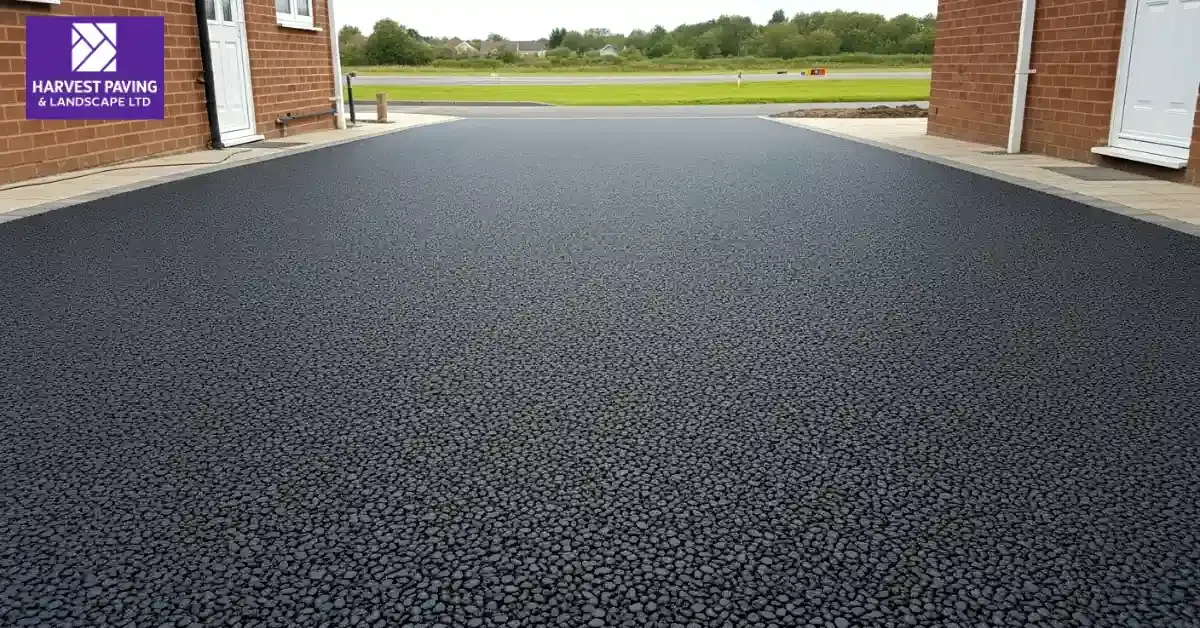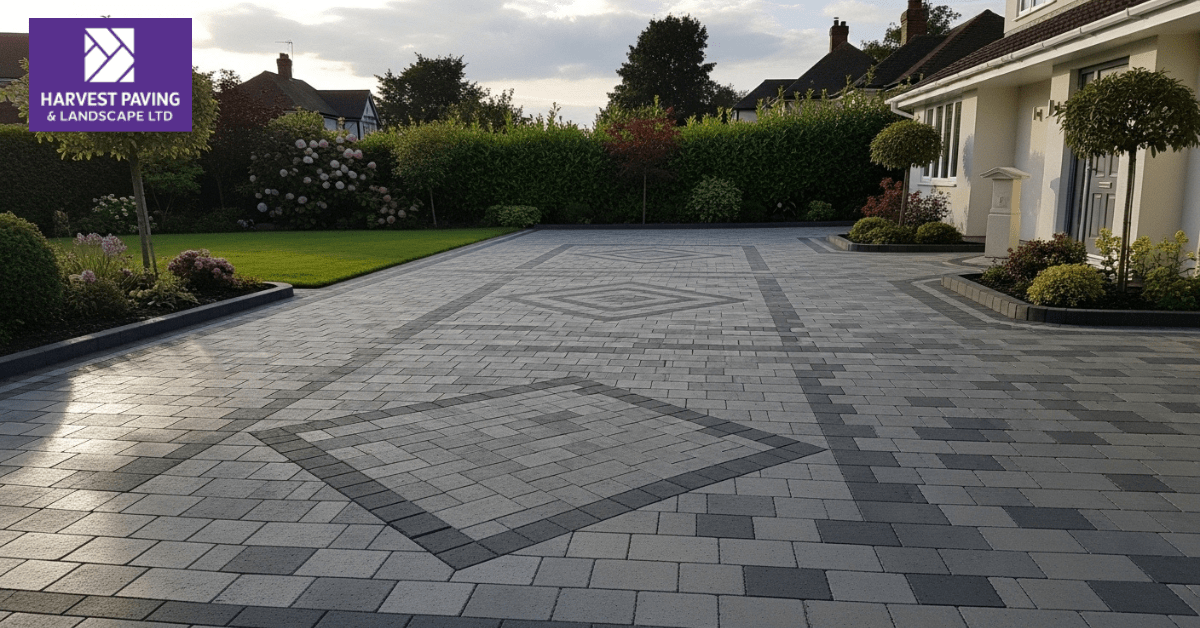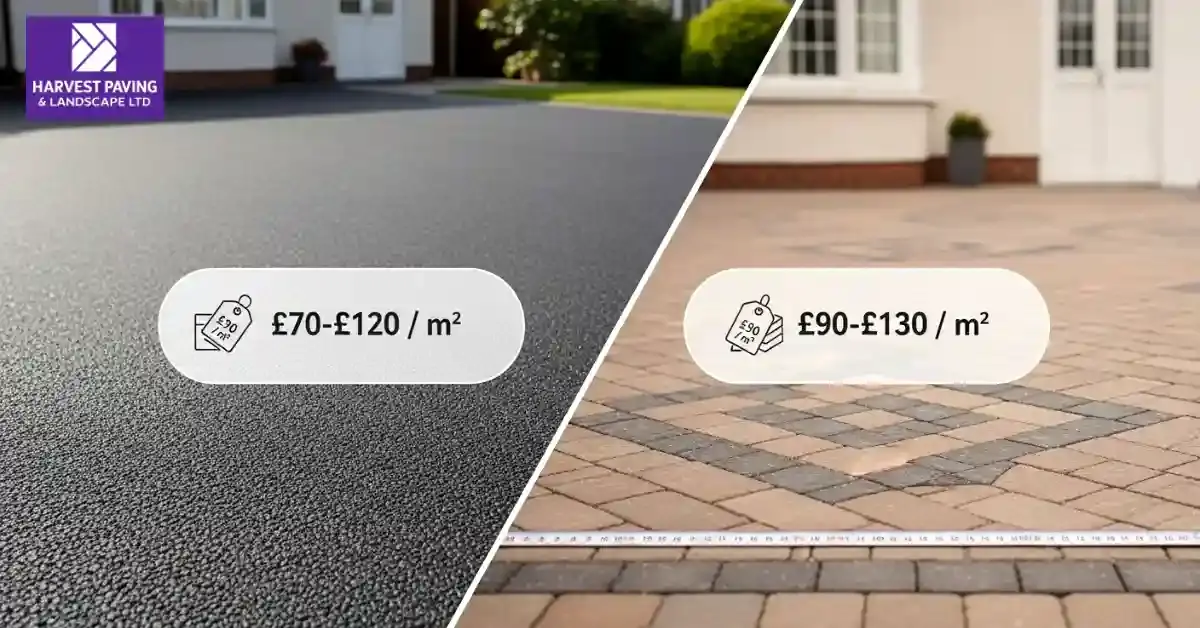Choosing the right driveway surface is more than just picking what looks nice. Your driveway must be durable, safe, easy to maintain, and fit your home’s style. Two popular options are tarmac driveways and block paving driveways. Both have advantages, but depending on your needs, one may suit you better. In this guide, we’ll break down the differences, costs, maintenance, and more to help you make an informed decision.
In this guide, we’ll break down the differences, tarmac vs block paving cost, installation, maintenance, and design ideas to help you make an informed decision.
What is a Tarmac Driveway?
Tarmac, short for tarmacadam, is a type of road or driveway surface made by combining crushed stone with tar or bitumen. It creates a smooth, long-lasting, and weather-resistant surface ideal for tarmac driveways. Tarmac is popular because it is strong, long-lasting, and easy to maintain. It also provides good traction for vehicles and can withstand heavy traffic.

Advantages of Tarmac
- Durability: A tarmac driveway can last 20–30 years if properly maintained. It withstands heavy vehicles and changing weather conditions well.
- Smooth Finish: Provides a flat, even surface ideal for walking, driving, or cycling.
- Cost-Effective: Generally cheaper than block paving driveways, making it a budget-friendly option.
- Quick Installation: Laying tarmac for a driveway is fast, reducing disruption to your home.
Looking to upgrade your home with a smooth and durable finish? Our Tarmac Driveway services offer strength, style, and long-lasting quality at affordable prices.
What is Block Paving?
Block paving is a method of creating driveways, pathways, or patios using individual bricks or blocks made of concrete, clay, or natural stone. Driveway block paving allows for easy repairs, as damaged blocks can be replaced individually. The blocks are laid in patterns and fitted tightly together, often with sand or mortar to lock them in place. This type of paving is durable, visually appealing, and allows for easy repair since individual blocks can be replaced if damaged. It also provides good drainage and can withstand heavy traffic, making it a popular choice for residential and commercial driveways.

Advantages of Block Paving
- Visual Appeal: Offers a wide range of colors, shapes, and patterns for driveway block paving. You can create a unique look to complement your home.
- Durability: High-quality block paving can last 25–30 years or more, especially if well-maintained.
- Repair Friendly: If a block cracks or is damaged, you can replace individual blocks instead of redoing the entire driveway.
- Permeable Options: Some block paving options allow water drainage, reduce puddles, and help prevent floods.
Ready to give your home a stunning new look? Our expert Block Paving services combine style, durability, and practicality to create driveways that stand the test of time.
Cost Comparison: Tarmac vs Block Paving Driveways
When planning a new driveway, understanding the costs involved is essential. Here’s a detailed look at what you can expect for both tarmac and block paving driveways:

Tarmac Driveway Costs
- Average Cost per m²: Typically ranges from £70 to £120, including materials and labour.
- Installation Costs: For a standard 50m² driveway, the total cost can range from £3,500 to £6,000, depending on site access, ground preparation, and any additional features.
- Additional Costs:
- Excavation and Disposal: Approximately £28 per m².
- Sub-base Preparation: Around £23 per m².
Tarmac is generally more affordable and quicker to install than block paving, making it a practical option for most homeowners.
Block Paving Driveway Costs
- Average Cost per m²: Ranges from £90 to £130, influenced by the type of block, pattern complexity, and additional features.
- Installation Costs: For a 50m² driveway, expect to pay between £4,500 and £6,500, with labour accounting for a significant portion of the cost.
- Material Variations:
- Concrete Blocks: Usually £20–£50 per m².
- Clay Blocks: Around £60–£100 per m².
- Composite Resin Blocks: Can go up to £95–£125 per m².
Block paving is more expensive but offers flexibility in design and aesthetics, which can add value to your property.
Looking for a reliable paving company in Colchester to handle your driveway project? We provide expert installation for both tarmac and block paving, ensuring quality, durability, and value for your investment.
Customization Options and Design Flexibility
One of the main reasons homeowners choose block paving over tarmac is design flexibility. With block paving, you can choose from:
- Different Shapes: Rectangles, squares, herringbone, basketweave, or custom patterns.
- Various Colors: Reds, browns, greys, or even mixed color designs to match your home.
- Borders and Accents: You can add a contrasting border or create patterns for a unique look.
Tarmac, on the other hand, has limited design options. You can choose colored tarmac or combine it with stone or gravel borders, but overall, it offers a simpler, more uniform look.
If creating a driveway that stands out and adds character to your home is important, block paving has a clear advantage.
Installation Process and Time
Understanding how each driveway is installed can help you plan your project and budget.
Tarmac Installation
- Preparation: The area is excavated, and a strong base layer of crushed stone is added.
- Laying Tarmac: Hot tarmac is poured and leveled for a smooth finish.
- Curing: Typically takes 24 to 48 hours before it can be driven on.
Tarmac is faster to install than block paving, making it ideal if you want minimal disruption.
Block Paving Installation
- Base Preparation: The ground is excavated, and a sub-base of crushed stone is compacted.
- Laying Sand Layer: A layer of sand is added to ensure the blocks sit evenly.
- Placing Blocks: Each block is placed individually in the chosen pattern.
- Joint Filling: Sand is brushed into gaps, and the surface is compacted.
Block paving is more labor-intensive, and installation can take several days depending on the size of your driveway. However, the result is highly customizable and visually striking.
Maintenance Requirements
Tarmac Maintenance
- Sealing: Every 3–5 years to protect against cracks and water damage.
Cleaning: Remove leaves and debris regularly to prevent moss or algae buildup. - Repair: Fill small cracks early to prevent larger damage.
Block Paving Maintenance
- Cleaning: Pressure washing keeps it looking clean.
- Sealing: Apply a sealant every 3–5 years to protect against staining, weed growth, and color fading.
- Weed Control: Apply weed killer or sand to prevent weeds from growing between blocks.
- Resending: Occasionally, top up joint sand to keep blocks stable.
Both options are relatively low-maintenance, but tarmac needs occasional sealing, while block paving requires some care to prevent weed growth.
Aesthetic Considerations
Tarmac gives a sleek, modern look and works well for contemporary homes, while block paving offers more character and can match both traditional and modern properties. Some homeowners combine styles, using block paving for borders and tarmac in the middle for cost savings and practicality.
Environmental Impact
Block paving is considered more environmentally friendly than some other surfaces because it can be permeable, allowing rainwater to drain through the gaps between the blocks and reducing runoff. This helps recharge groundwater and prevents flooding. The materials used, such as concrete or clay, can often be recycled at the end of their life. However, the production of concrete and clay does have a carbon footprint, so choosing sustainable or recycled blocks can further reduce environmental impact.
If you’re eco-conscious, consider the environmental effects:
- Tarmac: Made from bitumen, which is petroleum-based. Not very eco-friendly, but recyclable.
- Block Paving: Permeable block paving allows water to soak through, reducing flood risk and soil erosion. Concrete and clay blocks are more environmentally friendly than tarmac.
Choosing the Right Driveway for Your Needs
Here’s a quick guide to help you decide:
- Budget-Friendly: Choose tarmac if cost is a priority.
- High Aesthetic Appeal: Block paving is ideal for style-conscious homeowners.
- Heavy Vehicles: Both are strong, but tarmac handles weight slightly better over time.
- DIY vs Professional Installation: Tarmac is easier to lay for professionals quickly, while block paving often requires precise installation for the pattern.
- Longevity: Both last decades, but block paving offers easier repairs.
Still unsure which option is best for your home? Our trusted Paving & Landscaping Company in Colchester offers expert advice and professional installation of both tarmac and block paving driveways. Contact us today to get a tailored quote and transform your property with a driveway that lasts.
Conclusion
Both tarmac and block paving have their own strengths. Tarmac is practical, affordable, and quick to install, while block paving offers variety, elegance, and long-term durability. Your choice depends on budget, style preferences, maintenance commitment, and how you plan to use your driveway.
Ultimately, the best driveway is one that suits your lifestyle, complements your home, and stands the test of time.
FAQs
Which is better: tarmac or block paving?
It depends on your priorities. Choose tarmac for a budget-friendly, smooth driveway. Choose block paving for visual appeal and flexibility in design.
How long does a tarmac driveway last?
With proper maintenance, a tarmac driveway can last 20–30 years.With proper installation and care, a resin driveway can last 15–20 years or more.
How long does block paving last?
High-quality block paving can last 25–30 years or more. Damaged blocks can be replaced individually
Which driveway is easier to maintain?
Tarmac requires sealing every few years, while block paving needs occasional cleaning and weed control.
